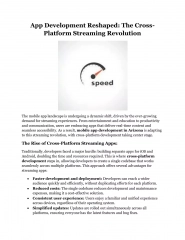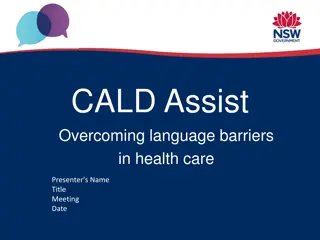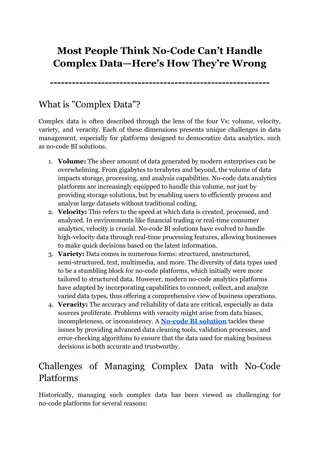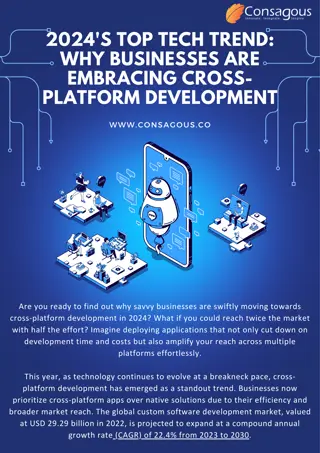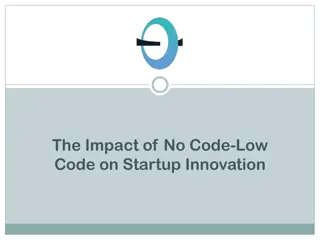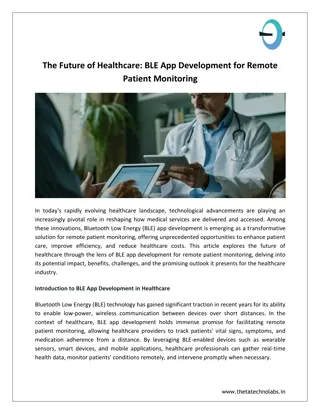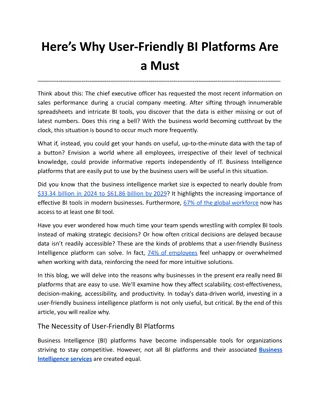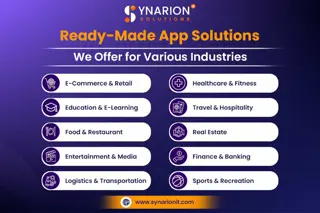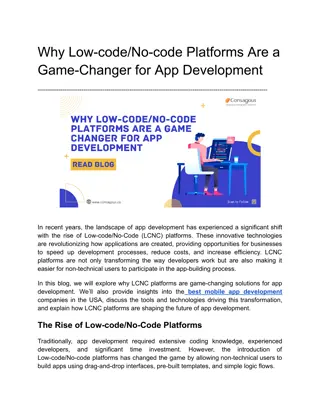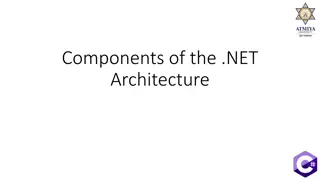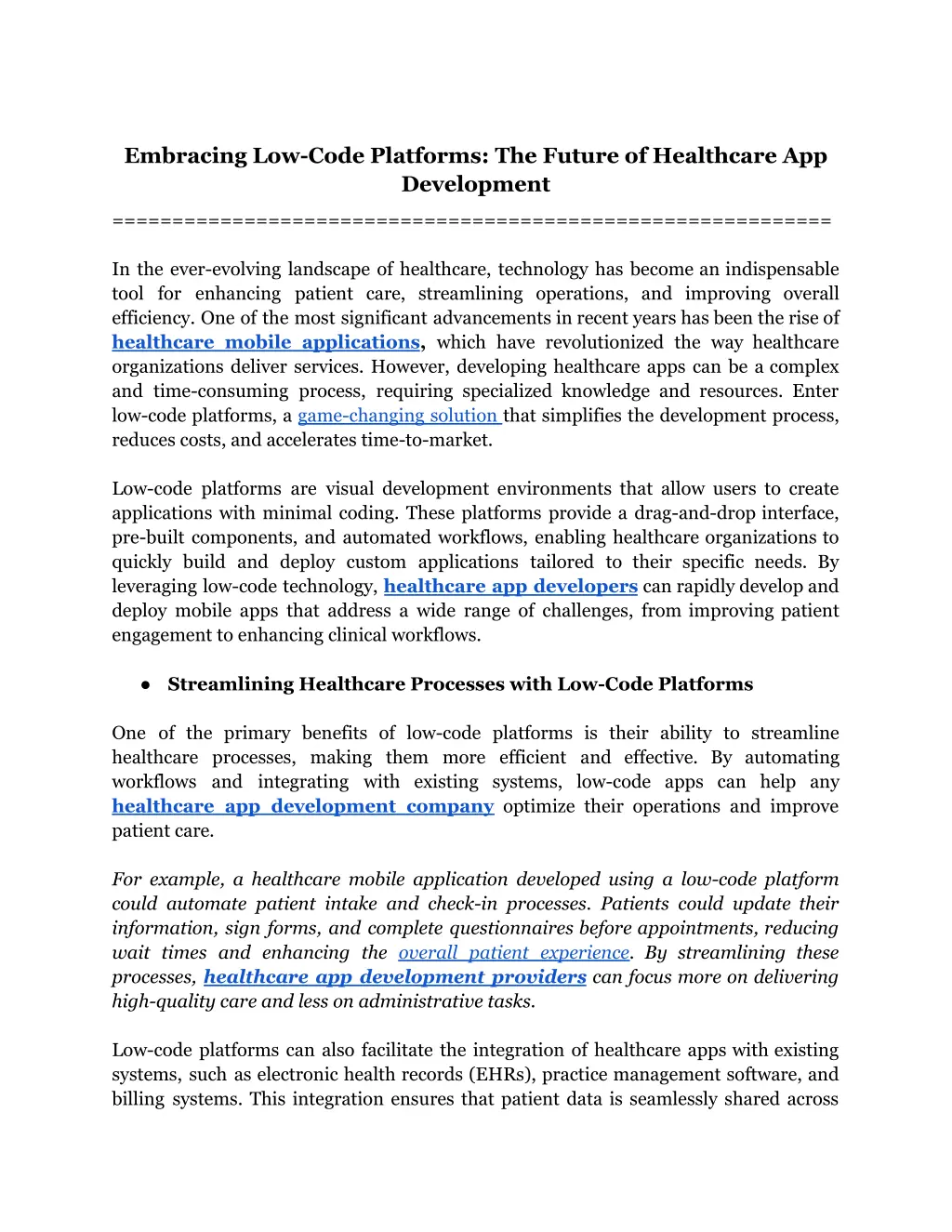
Embracing Low-Code Platforms_ The Future of Healthcare App Development
Low-code platforms simplify healthcare app development, enabling organizations to quickly build custom mobile apps. Explore benefits like faster time-to-market, cost savings, scalability, better collaboration, and agility. Learn how to choose the right platform prioritizing security, compliance, integration, user experience, scalability, and support for healthcare mobile applications. n
Download Presentation

Please find below an Image/Link to download the presentation.
The content on the website is provided AS IS for your information and personal use only. It may not be sold, licensed, or shared on other websites without obtaining consent from the author. If you encounter any issues during the download, it is possible that the publisher has removed the file from their server.
You are allowed to download the files provided on this website for personal or commercial use, subject to the condition that they are used lawfully. All files are the property of their respective owners.
The content on the website is provided AS IS for your information and personal use only. It may not be sold, licensed, or shared on other websites without obtaining consent from the author.
E N D
Presentation Transcript
Embracing Low-Code Platforms: The Future of Healthcare App Development ============================================================ In the ever-evolving landscape of healthcare, technology has become an indispensable tool for enhancing patient care, streamlining operations, and improving overall efficiency. One of the most significant advancements in recent years has been the rise of healthcare mobile applications, which have revolutionized the way healthcare organizations deliver services. However, developing healthcare apps can be a complex and time-consuming process, requiring specialized knowledge and resources. Enter low-code platforms, a game-changing solution that simplifies the development process, reduces costs, and accelerates time-to-market. Low-code platforms are visual development environments that allow users to create applications with minimal coding. These platforms provide a drag-and-drop interface, pre-built components, and automated workflows, enabling healthcare organizations to quickly build and deploy custom applications tailored to their specific needs. By leveraging low-code technology, healthcare app developers can rapidly develop and deploy mobile apps that address a wide range of challenges, from improving patient engagement to enhancing clinical workflows. Streamlining Healthcare Processes with Low-Code Platforms One of the primary benefits of low-code platforms is their ability to streamline healthcare processes, making them more efficient and effective. By automating workflows and integrating with existing systems, low-code apps can help any healthcare app development company optimize their operations and improve patient care. For example, a healthcare mobile application developed using a low-code platform could automate patient intake and check-in processes. Patients could update their information, sign forms, and complete questionnaires before appointments, reducing wait times and enhancing the overall patient experience. By streamlining these processes, healthcare app development providers can focus more on delivering high-quality care and less on administrative tasks. Low-code platforms can also facilitate the integration of healthcare apps with existing systems, such as electronic health records (EHRs), practice management software, and billing systems. This integration ensures that patient data is seamlessly shared across
multiple platforms, improving data accuracy and enabling healthcare providers to make more informed decisions. Enhancing Patient Engagement and Communication Effective communication and patient engagement are crucial components of successful healthcare delivery. Low-code platforms can help healthcare app development services by organizations develop mobile apps that improve patient engagement, foster better communication, and ultimately lead to better health outcomes. Consider a healthcare app that provides patients with quick access to their medical records, appointment scheduling, and secure messaging with healthcare providers. Such an app can significantly improve patient engagement by empowering individuals to take an active role in managing their health. Patients can easily access their health information, schedule appointments at their convenience, and communicate with their care teams, fostering a collaborative approach to healthcare. Furthermore, low-code platforms can facilitate the development of apps that support remote patient monitoring and telehealth services. These apps can enable healthcare app development providers to monitor patients' vital signs, track medication adherence, and conduct virtual consultations, improving access to care for patients in remote or underserved areas. Ensuring Security and Compliance in Healthcare App Development Healthcare applications handle sensitive patient data, making security and compliance with regulations like HIPAA and GDPR crucial. Low-code platforms have recognized this need and have evolved to offer robust security features and compliance support. Modern low-code platforms provide advanced security features, such as encryption, role-based access control, and audit trails, to protect patient data and ensure regulatory compliance. These platforms often undergo rigorous security testing and certification processes to ensure they meet the highest standards for data protection and privacy. Additionally, low-code platforms can assist healthcare organizations in maintaining compliance with industry regulations and guidelines. By providing automated workflows and pre-built components that adhere to regulatory requirements, these platforms help organizations develop app development for healthcare compliant applications more efficiently.
Choosing Development the Right Low-Code Platform for Healthcare App When selecting a low-code platform for healthcare app development, several factors must be considered to ensure the platform meets the unique needs of the healthcare app development industry: 1. Security and Compliance: Look for platforms that offer robust security features, such as encryption, role-based access control, and audit trails, as well as compliance with industry regulations like HIPAA and GDPR. 2. Integration Capabilities: Choose a platform that supports seamless integration with existing healthcare systems, such as EHRs, practice management software, and billing systems. 3. User Experience: Prioritize platforms that enable the creation of intuitive and visually appealing interfaces, enhancing user adoption and satisfaction. 4. Scalability and Performance: Consider platforms that offer high performance, scalability, and the ability to handle large amounts of data efficiently as your healthcare organization grows. 5. Support and Community: Choose a platform with a strong support system and an active community, ensuring access to resources, documentation, and guidance when needed. By carefully evaluating these factors and selecting the right low-code platform, healthcare organizations can maximize the benefits of low-code technology and develop healthcare mobile applications that meet their unique requirements and deliver exceptional patient care. Conclusion Low-code platforms have emerged as a powerful solution for healthcare organizations seeking to develop custom mobile applications quickly and cost-effectively. By leveraging visual development tools, pre-built components, and automated workflows, healthcare app development providers can build scalable and secure apps that meet their specific needs, streamline processes, enhance patient engagement, and ensure compliance with industry regulations.
If you're seeking a reliable and experienced healthcare app development partner, Consagous Technologies is a premium choice. As a leading healthcare app development company, We understand the unique challenges and requirements of the healthcare industry. With a team of experienced developers and a deep understanding of low-code platforms, Consagous can help you leverage the power of low-code technology to develop innovative and compliant mobile apps that streamline processes, enhance patient engagement, and drive digital transformation within your organization. Whether you need to develop a patient-facing app, a clinical workflow management solution, or a remote monitoring system, Consagous can help you bring your vision to life. By leveraging our expertise in low-code platforms and following industry best practices, Consagous ensures that your healthcare app is secure, compliant, and tailored to meet the unique needs of your organization. Don't hesitate to partner with us for your healthcare app development needs.


